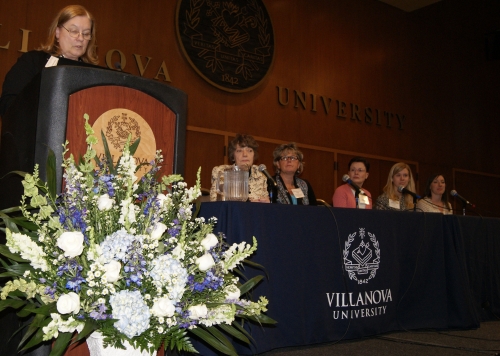Delivering Care to the Disenfranchised in Durban, South Africa

Alumna Dr. Christine M. Bruzek-Kohler moderated the South Africa panel that also included faculty Drs. Keen, Blunt and Bruderle, senior Beth Fijal and alumna Ali Spicer.
Traveling nearly 9,000 miles from Pennsylvania to Durban, South Africa, Villanova College of Nursing students have since 2008 provided care to individuals in a province that records the highest prevalence of HIV/AIDS in the country – about 39.5 percent of those seeking care at a clinic in the KwaZulu-Natal province have been diagnosed with the disease that has overwhelmed the nation’s healthcare system.
“I saw how health is a product of systems – such as education, poverty or race,” Elizabeth Fijal, a senior BSN student, said during a panel discussion, “Delivering Care to the Disenfranchised, Durban, South Africa,” at the College of Nursing’s 60th anniversary conference. “I saw how apartheid and race relations impacted health. I saw how education impacted health – there was so much stigmatism and misinformation about the diagnoses of HIV/AIDS.”
Fijal was one of four panelists who spoke during the discussion, the others being Alison Spicer, ’11 BSN, RN, Assistant Professor Elizabeth Blunt, PhD, RN, APN, BC, and Clinical Assistant Professor Elizabeth Bruderle ’90 MSN, PhD, RN. During the panel, Assistant Professor M. Frances Keen, DNSc, RN, the interim director of the College’s Center for Global and Public Health, gave an overview of the South Africa program, and Rear Admiral (Ret.) Christine M. Bruzek-Kohler ’74 BSN, MA, EdD, RN, FACHE, a Board of Consultors member, served as the moderator.
“We gained in every aspect of our being,” Dr. Bruderle said. “We get so much more than we give… You are really pushed beyond your comfort zone. It confirms and affirms why you are a nurse.”
The two students said it was especially moving to see nurses working at the Hillcrest Respite Center for HIV/AIDS patients, and both said their work as nurses in the U.S. has been dramatically impacted by the time they spent in South Africa.
“It’s amazing how many times I look back and realize how much I learned from what they’re doing there and their resilience and resourcefulness,” Spicer said.
